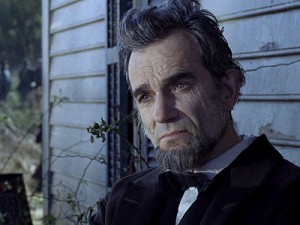 This past Saturday night, I went with a few friends to see Lincoln. You know me. If a historical movie comes to Atlantic Station here in Atlanta, I’m there opening weekend. Lincoln is the father of historical movies this year, so of course I went. I bundled up in my new Michael Kors sweater-cape and ventured out into the cold where Atlantic Station is beautifully decorated with lights on every street for Christmas. As I made my way to the theater, I realized it was Remembrance Day in Gettysburg and the people had done the illumination ceremony at the Gettysburg National Cemetery earlier that evening. It was quite fitting and serendipitous to see the movie that night.
This past Saturday night, I went with a few friends to see Lincoln. You know me. If a historical movie comes to Atlantic Station here in Atlanta, I’m there opening weekend. Lincoln is the father of historical movies this year, so of course I went. I bundled up in my new Michael Kors sweater-cape and ventured out into the cold where Atlantic Station is beautifully decorated with lights on every street for Christmas. As I made my way to the theater, I realized it was Remembrance Day in Gettysburg and the people had done the illumination ceremony at the Gettysburg National Cemetery earlier that evening. It was quite fitting and serendipitous to see the movie that night.
I had high expectations for Lincoln and I was not disappointed. Some might attend the movie expecting to see a biography of Abe, but I found the movie to be more of a biography of the 13th amendment with Abe as supporting cast. The film covers the last four months of his life in which he was trying to push the 13th amendment through the House of Representatives, much to the dismay, fear, anger, and opposition of nearly everyone around him. The 13th amendment, for those who may not know, outlawed slavery in America altogether. There was an article in The New York Times criticizing the way Spielberg portrayed the black characters in the movie, however, and I’m inclined to agree that it was lacking in that area. The movie opens with Abe talking to black soldiers about the unfair treatment in the army and how they’re pushing him to change it, but the rest of the black characters seem to sit passively by and wait for the white men to decide to free them. Historically, we know there was nothing passive about the black struggle for freedom. Yet, a movie about passing the 13th amendment shows black characters as nothing more than in service for white characters and happily or passively so. So in that manner, Spielberg fell short of the mark. To quote directly from the article:
The nation’s capital was transformed by the migration of fugitive slaves from the South during the war, but you’d never know it from this film. By 1865 — Mr. Spielberg’s film takes place from January to April — these fugitives had transformed Washington’s streets, markets and neighborhoods. Had the filmmakers cared to portray African-Americans as meaningful actors in the drama of emancipation, they might have shown Lincoln interacting with black passers-by in the District of Columbia.
Black oral tradition held that Lincoln visited at least one of the capital’s government-run “contraband camps,” where many of the fugitives lived, and was moved by the singing and prayer he witnessed there. One of the president’s assistants, William O. Stoddard, remembered Lincoln stopping to shake hands with a black woman he encountered on the street near the White House.
In fact, the capital was also home to an organized and highly politicized community of free African-Americans, in which the White House servants Elizabeth Keckley and William Slade were leaders. Keckley, who published a memoir in 1868, organized other black women to raise money and donations of clothing and food for the fugitives who’d sought refuge in Washington. Slade was a leader in the Social, Civil and Statistical Association, a black organization that tried to advance arguments for freedom and civil rights by collecting data on black economic and social successes.
This is not to say I disapprove of Lincoln altogether. Not in the slightest. I disapproved of the way black people were portrayed in it.
If we overlook some of the historical liberties Spielberg took in the name of storytelling (as a storyteller, I understand why it’s necessary sometimes), the way Daniel Day-Lewis portrayed Abe was truly an astonishing thing to watch. He is infamous for total Method acting and it paid off for him in this movie. He was Abe. I’ve seen quite a few Daniel Day-Lewis movies but only in this movie could I watch him in character and not recognize “Daniel” at all. Not by appearance, not by mannerisms, and not by voice. The voice, by the way, has been panned by some critics as weak and shrill, but clearly said critics never actually read descriptions of Abe’s voice from his contemporaries. Daniel’s interpretation of those descriptions was, in my opinion, as true to what was the real thing as we could get without a recording of the real voice to copy. The way he walked and carried himself in the simple brown suit made me physically feel the weight of the country on his shoulders. I imagine it must be extremely difficult for any actor to feel what his character felt but Daniel manages it with skill.
This Abe actually presented a bit of his humor and fondness for storytelling to the audience, which are aspects of his personality that usually go ignored. He was also depicted dealing with a less than stable wife, fighting with her, trying to appease her, etc., and those were things that swept under the rug in his time. Abe’s human side and, at times, inability to deal with the stress in his own family let alone the stress in the country brought him down from the ivory tower a little more.
The supporting cast was equally matched with Daniel Day-Lewis and sometimes even stole the show. Tommy Lee Jones, in particular, brought charm to Thaddeus Stevens, who was ordinarily viewed as a rather prickly, nearly villainous fellow in Reconstruction legislature. Jones managed to give his witty sarcasm an effortless air and you end up liking him by the end of the movie. Sally Field had possibly the most difficult role in the film as Mary Todd Lincoln. As soon as I heard Field was cast, I knew they intended to bring out some of Mary’s crazy since Field has an uncanny ability to switch instability on and off in her performances, and I was right. I was pleased to see that the instability in Mary did not make her look like a caricature though. It was done carefully, leaving you to wonder if she was really just caught up in grief or truly suffering from mental illness. Joseph Gordon-Levitt as her son, Robert Todd Lincoln, did quite well considering I had only previously seen him in Third Rock From The Sun. I have nothing bad to say about the supporting cast, which is a feat in itself, because the movie could have easily been Daniel Day-Lewis dragging everybody through the film by the scruffs of their necks.
Lincoln is not a biography of the sixteenth president. It’s a larger discussion about what it took to pass the 13th amendment, including Abe and his cabinet fighting each other and making back room deals for votes. I think some people not so educated about it will be surprised to see Abe’s handlers engaging in back room deals to get what they wanted with his approval. His hypocrisy in keeping Robert out of the war while sending thousands of other sons to die is shown in blinding light through Robert’s perspective. One of the most intense and moving scenes of the movie involved no dialogue whatsoever as Robert witnesses hundreds of amputated limbs being thrown into a pit. He fights his parents for the entire movie to join the army. Finally, he accuses his father of being afraid of his mother and impulsively Abe slaps him. These scenes are so important in showing the humanity and sometimes bad decisions this family made, that they were entirely fallible and not at all godlike. It is the stripping away of immortality that makes the story even more extraordinary. Lincoln is quite relevant today given our current deeply divided political climate and blind hatred of our alleged dictator, socialist president. The difference is we have the benefit of hindsight and the ability not to repeat the old mistakes if we have the courage to stand by our convictions.
Read More
































